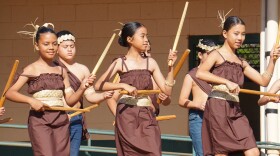Genealogical research out of the University of Hawaiʻi at Mānoa is offering Native Hawaiians an opportunity to reconnect with their ancestral roots.
The Moʻopono Project, which launched in 2021, is in the process of digitizing thousands of pages of moʻokūʻauhau, or genealogy material, dating back to the mid-1800s.
This includes material from the Kingdom era’s Board of Genealogy of Hawaiian Chiefs, the private collection of Prince Kūhiō Kalanianaʻole, and other rarely seen archival records.

Lead researcher Alyssa ʻĀnela Purcell, a PhD student in Indigenous Politics at UH Mānoa, presented the project at the United Nations' Forum on Indigenous Issues in New York.
“We believe that moʻokūʻauhau is an active living force that we want to engage with on a daily basis. We have always recognized that moʻokūʻauhau is an active tool, our monarchs understood that,” Purcell said.
“When Queen Liliʻuokalani was in prison in her own palace for eight months, one of the things that she sought and clung to during that politically tumultuous time was the Kumulipo, one of our origin stories. It connects us back to the beginning of time as a people, so it's a collective genealogy,” Purcell said.
"So what she did while she was in prison was she translated it. And what she did at the very, very end of it is she weaved in her own genealogy,” she said.
“And in my opinion, in my research, in my analysis of that, it's an active resistance. It's a form of continuity.”
Purcell said knowing that these genealogy records exist and making them accessible allows current and future generations to weave themselves into it.
To date, more than 7,300 pages of handwritten material have been transcribed and uploaded to a searchable database.
For more information on the project, click here.





